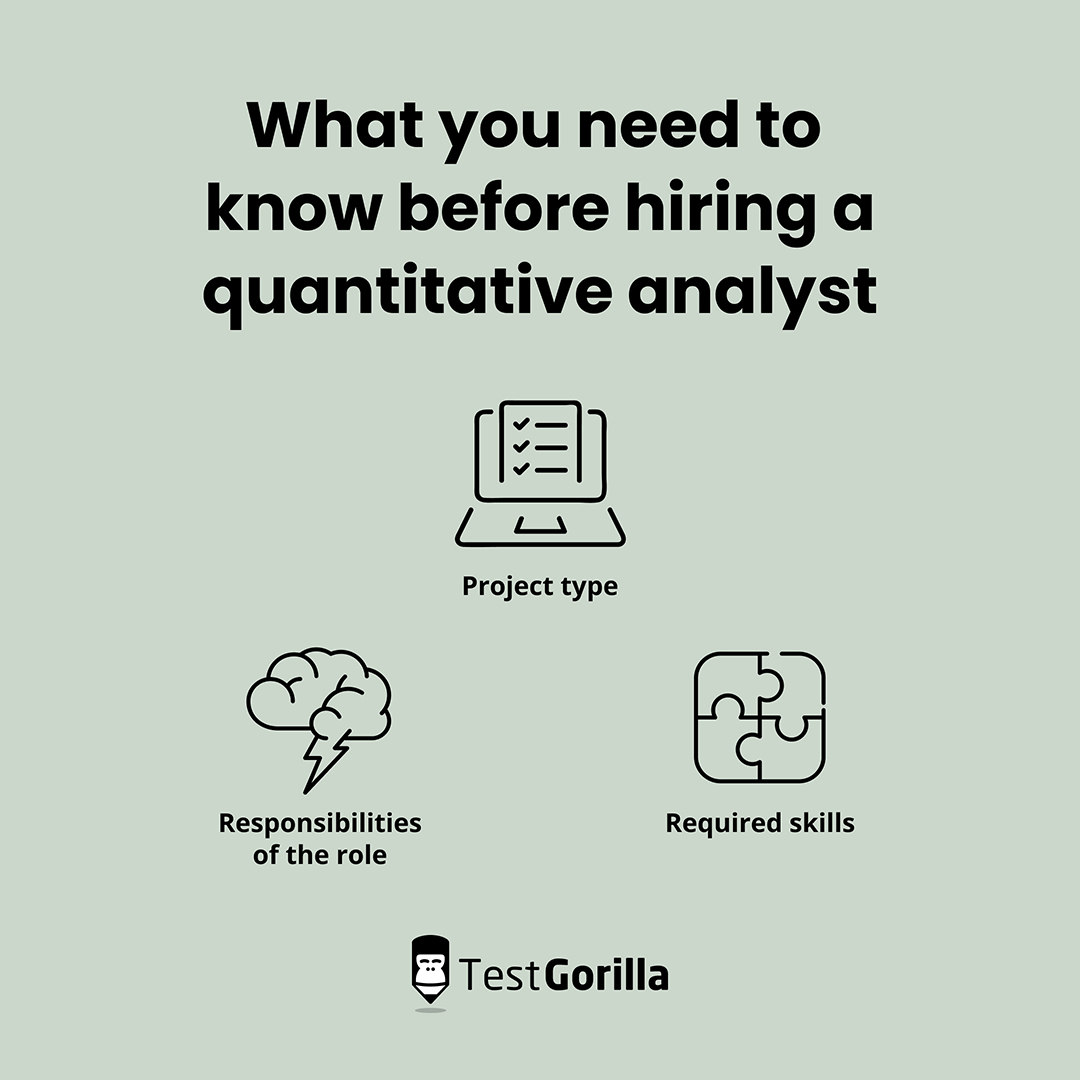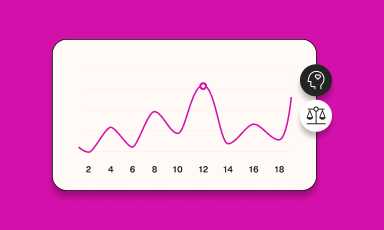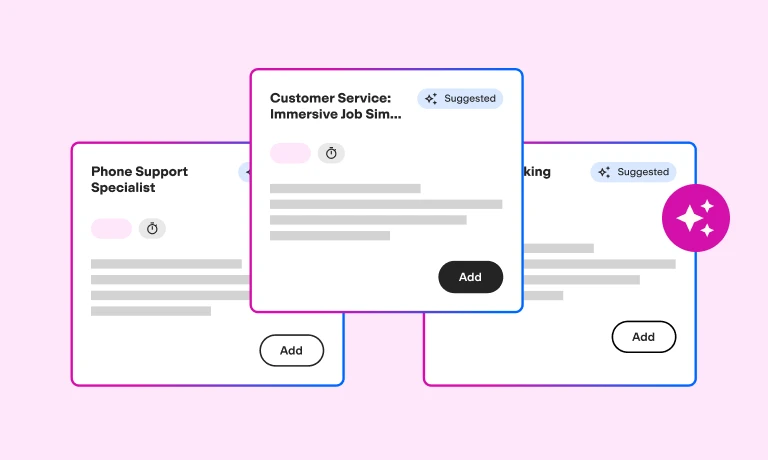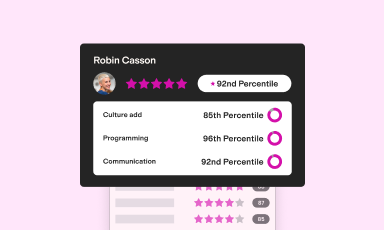Hiring the best quantitative analyst for your business comes with significant challenges. The role demands a strong background in mathematics, statistics, finance, and programming, which can mean there’s often a scarcity of skilled candidates and fierce competition for top talent.
Traditional hiring strategies that rely heavily on degree inflation and resume screening fail to assess quantitative analysts’ niche skills adequately. These methods can overlook skilled talent and increase the likelihood of mis-hiring, resulting in a misuse of company resources.
Pre-employment testing platforms help to eliminate the biases associated with traditional candidate screening methods, focusing on skills-based testing instead. These recruitment tools provide hard data about your candidates’ in-demand quantitative analysis skills while saving you time and money in the recruitment process.
This guide will help you find the best quantitative analyst for your business. We’ll look at everything you need to know before hiring, from understanding the unique skills and qualifications required for the role to sourcing and selecting top-level candidates.
Table of contents
- What you need to know before hiring a quantitative analyst
- Skills and qualifications to look for in a quantitative analyst
- Where to find potential candidates
- Attracting candidates with great job descriptions
- Assess candidates with multi-measure skills tests
- Ask the right interview questions
- Common mistakes when hiring a quantitative analyst
- Hire the best quantitative analysts with TestGorilla
What you need to know before hiring a quantitative analyst
Quantitative analysis is a wide-ranging field that helps businesses from different industries make data-driven decisions, optimize processes, and gain valuable insights to improve their overall performance and competitiveness.
For example, many organizations hire quantitative analysts to:
Develop models to assess and manage financial risks
Conduct market research to predict a product’s success
Create algorithmic trading strategies to maximize trading profitability
Optimize investment portfolios to help investors achieve financial goals
Before jumping into the hiring process, it’s essential to understand the kind of expertise and experience you want from a candidate and the nature of the position you’re trying to fill.
Start by defining the tasks and responsibilities of the role and the specific skills the candidate should have to be successful, considering the following:
Project type
Responsibilities of the role
Required skills
1. Project type
Analyze the components of the project to determine what skills and knowledge will be required by your candidate. Consider the following factors:
Complexity and scope: Understanding the project's intricacy and size helps determine the level of experience and specialization required.
Specific techniques and models: Knowing if the project requires quantitative methods or models means looking for candidates with specific knowledge.
Duration and timeline: Knowing the project's expected length and key deadlines can help find a quant who is available and committed for the entire duration.
2. Responsibilities of the role
Another factor to consider is the responsibilities of the quantitative analyst role you're hiring for. These include the following:
Data analysis
Many organizations regularly employ quants to analyze large datasets and use statistical techniques to identify trends, hidden relationships, risks, and anomalies in domains such as finance, economics, or scientific research.
Financial forecasting
Financial companies also rely on quants to predict future financial trends, assess potential outcomes, and support strategic decision-making in budgeting, investment planning, and revenue projections.
Numerical simulations
Quantitative analysts often create numerical simulations to model complex systems or processes, such as climate models, molecular dynamics simulations, or astrophysical simulations.
These simulations enable research organizations to study scenarios that are difficult or impossible to replicate in real-world experiments.
3. Required skills
To ensure that your hiring process targets the right candidates for your role, focus on the skills your quant needs to benefit your organization, such as:
Mathematical proficiency
Programming skills
Financial knowledge
Data analysis
Problem-solving
Critical thinking
To identify clear skills criteria, you can also perform a skills gap analysis to compare the existing skills in your organization with the skills needed to be filled by the quantitative analyst role.
Skills and qualifications to look for in a quantitative analyst
When seeking a proficient quantitative analyst, you need to identify the key skills and qualifications that will ensure their success in the role. Examples of these skills and qualifications include:
Advanced mathematics
This subject refers to the sophisticated mathematical theories, techniques, and tools quants use to analyze and solve complex financial and data-driven problems.
These mathematical skills provide the foundational framework for developing and analyzing complex quantitative models used in quant roles, such as pricing financial derivatives or assessing risk.
Programming proficiency
Proficiency in programming languages, such as Python, R, MATLAB, or C++, is necessary for data analysis, model development, and algorithm implementation.
For example, quants often use programming to automate processes like:
Collecting financial market data and economic indicators
Cleaning and preprocessing raw data
Generating regular reports summarizing performance metrics and risk assessment
Statistical analysis
Statistical analysis enables quants to make sense of large financial data sets, finding patterns, trends, or irregularities. This knowledge helps them make informed predictions, assess risks, and optimize strategies in the complex world of finance.
Critical thinking
Although quantitative analyst roles are highly technical, soft skills are essential for successful teamwork.
Quants with excellent critical thinking skills can analyze complex financial data, identify patterns, and make informed decisions. They use these skills to evaluate the strength of their quantitative models and check their calculations to avoid errors, protecting organizations from financial risks.
Communication
Effective communication skills enable quants to communicate their findings and insights to non-technical stakeholders, such as executives or clients, clearly and understandably.
Adaptability
Adaptability refers to a quantitative analyst’s ability to stay current with industry trends and emerging tools and methodologies. It enables them to refine their skills and respond effectively to changing market conditions and data sources.
The best insights on HR and recruitment, delivered to your inbox.
Biweekly updates. No spam. Unsubscribe any time.
Where to find potential candidates
Candidate sourcing is essential to attracting and selecting top talent. However, talent pools can be limited for roles that require specialized skill sets. And, with the rise of data-driven decision-making, industries other than finance, like healthcare, technology, and e-commerce, are also seeking quantitative experts, outstripping talent supply.
That said, you can address talent scarcity problems by sourcing candidates from the right places, such as:
Academic institutions: Many quants come from rigorous academic backgrounds with access to strong programs in mathematics, finance, physics, or computer science.
Online job networks: Specialized job boards often have profiles and listings for experienced quants in the financial industry.
Quantitative research firms and hedge funds: Many skilled quants work at specialized research firms, hedge funds, or proprietary trading firms. Tapping into these networks can provide access to top-tier talent.
Attracting candidates with great job descriptions
To avoid engaging the wrong candidate, focus on the specific knowledge, skills, and competencies your role requires.
To write a great job description for a quantitative analyst role, follow these best practices:
Clearly define the skills and responsibilities of the role
Describe the company culture and the position you are looking to fill
Set out your compensation and benefits packages
Explain the working conditions (hours, location, remote offerings)
Use keyword optimization so candidates can find your job posts
By following these best practices, you can create an effective quantitative analyst job description.
Assess candidates with multi-measure skills tests
Once you have attracted quality candidates to your talent pool, use a combination of multi-measure talent assessments to predict their fit with your organization and potential to succeed.
Skills tests are a speedy, affordable, and accurate way to eliminate unqualified candidates and advance stellar ones. Before spending time and resources on an interview, offer candidates a custom assessment to learn about their role-specific skills, personality types, and cognitive abilities.
Ask the right interview questions
Once you have identified a candidate with the right technical and soft skills for your quant role, it’s time to advance them to the interview stage.
To keep your interviews unbiased and skills-focused, conduct a structured interview. This way, interviewers stay on track throughout the process, candidates’ responses can be graded, and each candidate can answer the same questions in the same order to avoid bias at the interview table.
Common mistakes when hiring a quantitative analyst
Quantitative analysts are often embedded in the technical, organizational, and financial processes of their organizations. This means they have a major impact on the success of your business.
To avoid the cost of a bad hire, like lost productivity and low team morale, steer clear of these pitfalls:
Overlooking soft skills: Communication and teamwork, for example, are crucial for effective collaboration and conveying quantitative findings.
Relying solely on academic credentials: Prioritizing academic qualifications over practical experience can lead to hiring candidates with strong educational backgrounds but limited skills.
Ignoring culture add: Failing to assess whether a candidate aligns with and adds to organizational culture can damage workplace dynamics, team morale, and productivity.
Hire the best quantitative analysts with TestGorilla
Many organizations fail to attract and select strong candidates. This can be due to increased competition, talent scarcity, or outdated screening methods. Knowing how to source skilled candidates and assess their talents is vital for company success and avoiding the pitfalls of mis-hiring.
Skills-based hiring platforms, like TestGorilla, offer customizable, multi-measure talent assessments you can tailor to your role and use to evaluate the unique blend of technical and soft skills that quantitative analysts need – all while saving your organization time and resources.
To attract and hire the best quantitative analyst, sign up for TestGorilla’s Free plan or request a free 30-minute live demo today.
You've scrolled this far
Why not try TestGorilla for free, and see what happens when you put skills first.



















